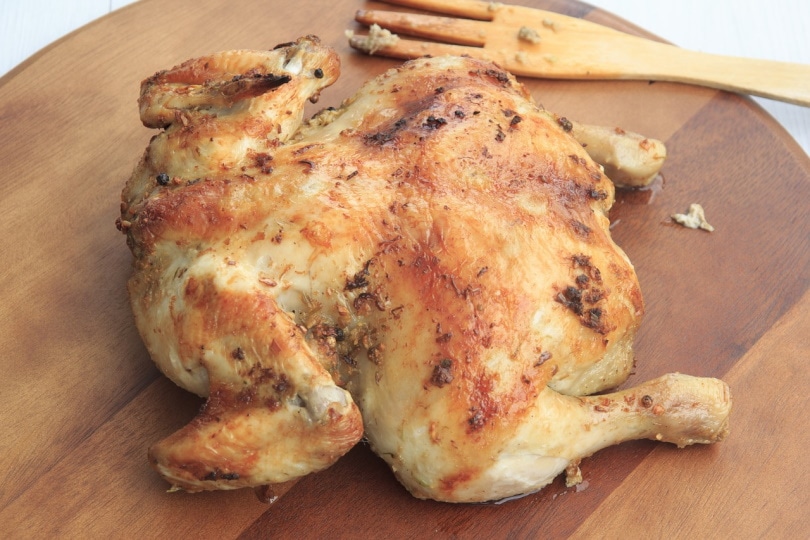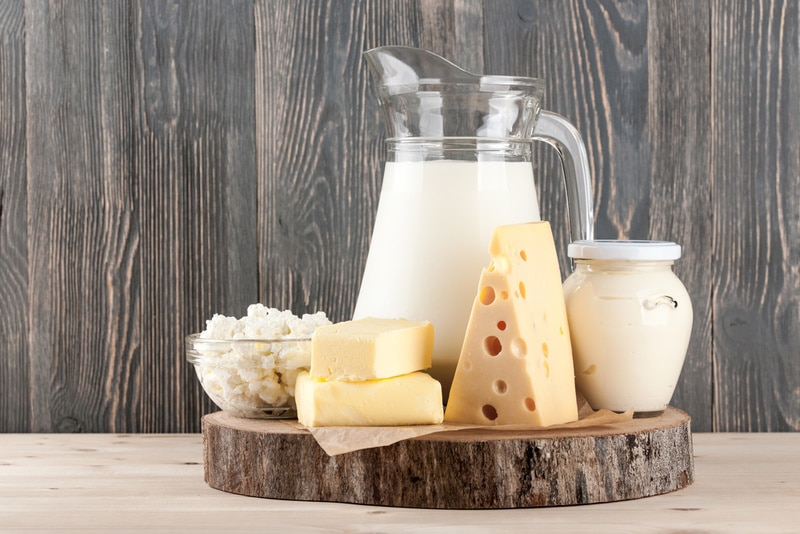
They may not be as affectionate as dogs or as adorable as cats, but turtles have at least one huge advantage over those other pets: They won’t beg for food every time you sit down for a meal.
Still, the urge to share your dinner with your pets is real, and it extends to reptiles as well. Before you break off a piece of whatever you’re eating and toss it in their tank, though, you should do research to make sure that it’s safe for your turtle to eat.
After all, while there are some human foods that are perfectly fine for turtles to consume, there are others that may kill your little buddy. Here, we look at the human foods that are safe for sharing, so you can finally tell your turtle to turn off their puppy-dog eyes.
Disclaimer: There are many different species of turtles in the world, and they can’t all eat the same things. While the foods on this list are generally safe for turtles, you should always research what’s safe for your particular species of turtle before sharing your supper.
1. Fresh Fruits and Veggies
If you have fresh fruit or vegetables in your fridge or pantry, chances are that your turtle will be just as happy to snack on them as you are. They especially like leafy green veggies, so kale, collard greens, and mustard greens are both healthy and delicious for them. They’ll also chow down on carrots, squash, green beans, and peas. As far as fruits go, you can give them bananas, apples, and pears, among other things.
A few words of warning, though: Always wash any produce before feeding it to your turtle, as there may be stray pesticides on it that could be harmful to them. Also, there are a few fruits and veggies that you shouldn’t share, including onions, garlic, shallots, spicy peppers, citrus, and iceberg lettuce.

2. Canned Fruits and Vegetables
You may not have had the chance to head down to the farmer’s market recently, so you’re completely out of fresh fruits and veggies. Don’t worry, your turtle will happily gulp down the canned stuff as well. The list of acceptable canned fruits and vegetables is almost the same as the list of fresh fruits and veggies, with a few exceptions.
You don’t want to give your turtle anything that’s been sitting in oil, and avoid foods with additional salt (ideally, you wouldn’t give them any salt at all). Also, don’t give them anything that’s been pickled.
3. Canned Fish
This one makes sense — turtles live in the water and fish live in the water, so it’s only a matter of time before one would eat the other. Canned whole fish can make a great treat for your turtle, so feel free to break out the can opener and share your sardines, anchovies, and other fishy delights.
As with canned fruits and veggies, though, don’t give your turtle anything that’s been swimming in salt and oil. You should rinse the fish off in cool water before throwing it in the tank, just to remove any traces of salt, pesticides, or other harmful debris.

4. Fresh Fish
While canned fish is good for your turtle, fresh fish is likely better (provided that it’s been caught someplace that isn’t riddled with toxic pollution).
However, most fish that you’ll find at the grocery store doesn’t contain the proper balance of phosphorous and calcium that turtles need, so don’t give your turtle too much of your salmon. A bite once or twice a month is plenty. Be sure you cook it too, as turtles don’t normally eat large fish in the wild, so it may contain bacteria or parasites that they can’t handle.
5. Cooked Chicken
Turtles haven’t adapted to eating chicken, but that doesn’t mean they won’t enjoy the occasional bite of your grilled bird. The key is to make sure you don’t salt it or add any other seasonings or condiments. Only offer a small amount to your turtle on special occasions.
The most important thing here is to remember to cook the chicken thoroughly. Turtles have been known to carry salmonella, and you don’t want to transfer the bacteria from raw chicken to your turtle. This could make it dangerous for you to hold or otherwise interact with them.

- Here’s a more in-depth look: Can Turtles Eat Chicken? What You Need to Know!
6. Ground Beef
Surprisingly enough, turtles have adapted to eating beef enough that you can give your turtle a bite or two of ground beef if you like.
As with chicken, make sure that it’s completely plain, and drain all the oil off of it before you toss it in the tank. Raw beef isn’t as dangerous as raw chicken, but you should still be sure it’s cooked thoroughly before sharing it.
7. Pork
Yes, your underwater buddy can eat pork, just like fish, chicken, and beef. Make sure there’s no seasoning on the pork, it’s been thoroughly patted-dry to remove oils, and it’s completely cooked.
We should also mention that many people will tell you not to feed your turtle pork, beef, or chicken, as they’re not foods that turtles have evolved to eat. These people are mostly right — your turtle certainly doesn’t need these foods, and they’re largely devoid of the nutrition that turtles need to survive. This list is about human foods that won’t kill your turtle, though, and as long as you follow our instructions, your pet should survive their battle with your pork chop.

8. Eggs
Eggs are foods that turtles probably shouldn’t eat (but they can). While eggs are loaded with protein and iron, they’re also packed with cholesterol, which is bad for turtles. As a result, you should offer eggs to your turtle very sparingly, if at all.
You should also know that turtles like their eggs like they like their detectives: hard-boiled. In fact, that’s the only acceptable way to prepare an egg for a turtle, so don’t offer them your scrambled or over-easy leftovers. Chop the hard-boiled egg into small pieces and drop it in the tank, and if you’re really going for extra credit, remove the yolk first, as it’s full of saturated fat.
The 7 Human Foods That You Should Never Give Your Turtle
So far, we’ve focused on the foods that are acceptable to share with your turtle, but there are a few things in your kitchen that you should keep to yourself.

1. Fried Foods
All the oil and fat in fried foods are terrible for your turtle. Not only are they unable to digest these, but they will also negatively impact their health.
2. Chocolate
While it may be tempting to give your turtle a taste of your favorite dessert, just don’t do it. Turtles are like dogs in that chocolate can kill them graveyard dead (they’re unlike dogs in most other respects, though).
3. Dairy Products
Turtles lack the enzymes necessary to break down dairy products, so don’t dump a glass of milk in your turtle’s tank. This also means you shouldn’t share cheese, or anything with butter, yogurt, etc.

4. Nuts
Nuts contain a large number of oxalates, which block the absorption of calcium. Your turtle needs plenty of calcium, so if you give them too many oxalates, you’ll have a dead turtle on your hands before long.
5. Bread and Pasta
Bread and pasta have no nutritional value and turtles can’t properly digest them. While it’s unlikely to kill them, it’s bad for their health in the long run.
6. Processed Foods
This category includes lunch meat, sausage, and anything else loaded with salt and preservatives. It’s just plain bad for your turtle.
7. Anything With Refined Sugar
Any candy or food with processed sugar should be avoided.

Keep Your Turtle on a Turtle’s Diet
It’s important to remember that turtles have evolved to eat things that they find in their natural habitat, and it’s unlikely that they’ve spent much time in an underwater McDonald’s. As a result, you should severely limit the number of human foods that you give them (with the possible exception of fresh fruits and veggies).
Instead, give them turtle pellets or other foods that have all the nutrition they need. While a turtle will eat just about anything you offer them, they don’t necessarily want your food, so don’t force it on them.
Related read:
Featured Image Credit by: PeterVrabel, Shutterstock








